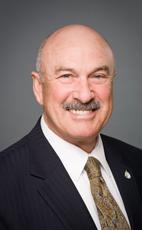Mr. Speaker, as a former breathalyzer technician and police officer, I am particularly interested in this most serious matter.
I am pleased to speak to Bill C-376 which proposes to create a new Criminal Code offence of driving a motor vehicle while having a blood alcohol content level in excess of 50 milligrams of alcohol per 100 millilitres of blood.
It does not propose simply to amend the Criminal Code to lower the blood alcohol content from the current 80 milligrams per 100 millilitres of blood, or .08 as it is commonly referred to.
The bill was debated for one hour in the first session of this Parliament. Every member who spoke to the bill and I am sure every member of the House agreed with the goal to reduce the death toll and injury on our highways caused by impaired drivers.
However, serious concerns regarding the mechanics of the bill, particularly its proposal to create a Criminal Code ticket and whether it would be used by police, were expressed by members.
For many years, law enforcement and prosecutors have complained about the complexities of the current impaired driving laws, the time needed to process the charge, the length of trials and the number of cases that are lost on technicalities. They have not asked for a lower blood alcohol content.
I am pleased that the government has responded to those concerns. Bill C-2, the tackling violent crime act, would simplify procedures and restrict defences to over .08 charges to those that have scientific validity. However, Bill C-2 is not a substitute for a complete review of the impaired driving provisions of the Criminal Code.
As members know, the Criminal Code has two separate and distinct drinking and driving criminal offences. Under section 253(a), it is a crime to drive while one's ability to drive is impaired by alcohol or a drug. Under section 253(b), it is an offence to drive while one's blood alcohol content exceeds .08. The over .08 offence was enacted in 1969, based on a seminal scientific study in Michigan showing that at that level the risk of collision increases exponentially for all drivers, regardless of age, driving experience and drinking experience. The Michigan study has been validated repeatedly.
Recent studies have concentrated on impairment at .05. I believe there is a scientific consensus that indicates a degradation in driving skills and increased risk of accident at that level.
One study concluded that compared with a driver at zero blood alcohol content, a driver at .05 had a 38% greater chance of being involved in a collision. A driver at .06 had a 63% higher risk and a driver at .07 had a 109% higher risk.
To date, Canada has chosen to address the problem of the driver who is over .05 but less than .08 through administrative measures imposed by provinces pursuant to their legislative authority to address licensing matters and matters of the Highway Traffic Act.
All provinces and territories except Quebec already have a roadside suspension for being over .05. I am pleased to say that Quebec has announced that it will soon be introducing a suspension at that level. These suspensions occur without any criminal charge being laid and, therefore, without a trial. They are an immediate and certain road safety measure.
The issue for the House, I submit, therefore, is whether to lower the permissible blood alcohol content to .05 or leave the low blood alcohol content driver to be dealt with by the province, at least until there has been a comprehensive review of impaired driving countermeasures.
The provinces work together through the Canadian Council of Motor Vehicle Transport Administrators or CCMTA, which has a subcommittee on impaired driving. The CCMTA reports to federal, provincial and territorial transport ministers. The CCMTA has endorsed a model of sanctions for driving while being over .05 that would include the recording of violations, longer roadside suspensions, a licence reinstatement fee of $150 to $300 and recording the violation for 10 years so that repeat violators can attract higher sanctions.
If the provinces enact increased sanctions at over .05 level for all drivers as recommended by the CCMTA, Criminal Code sanctions may not be needed. Certainly the provincial administrative sanctions will always be easier to process than a criminal charge. I seriously question whether a police officer faced with—

